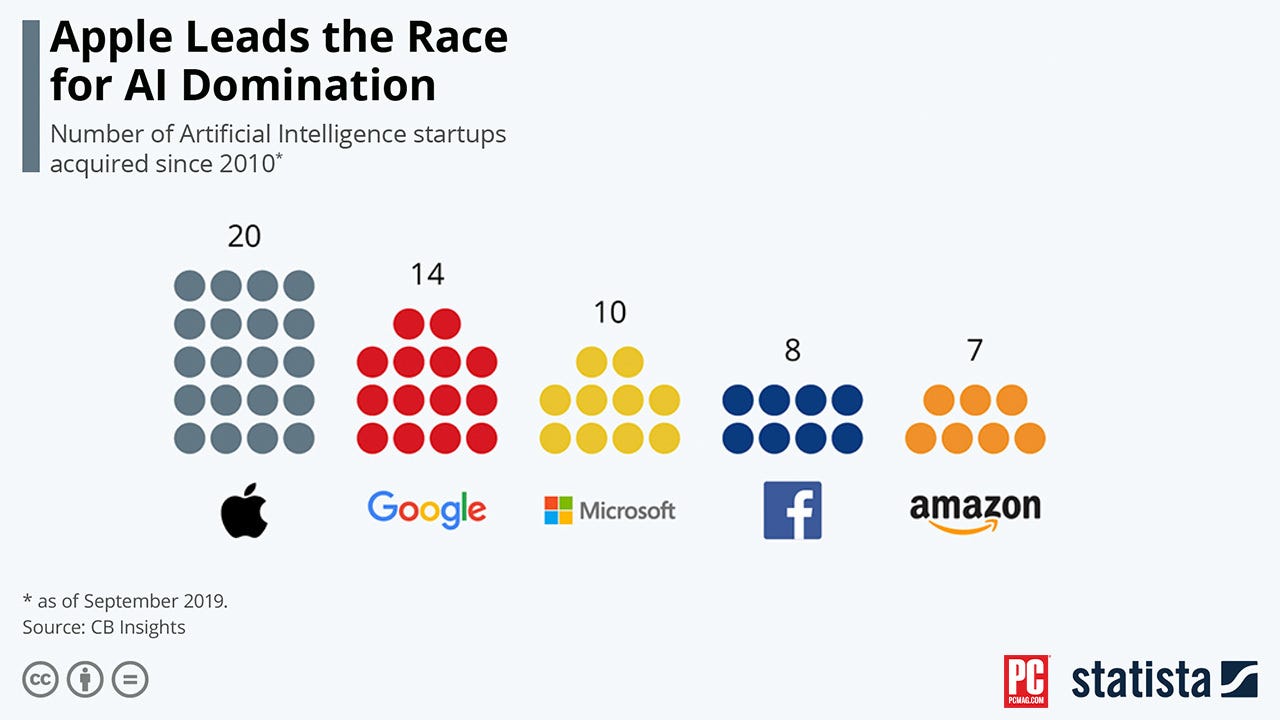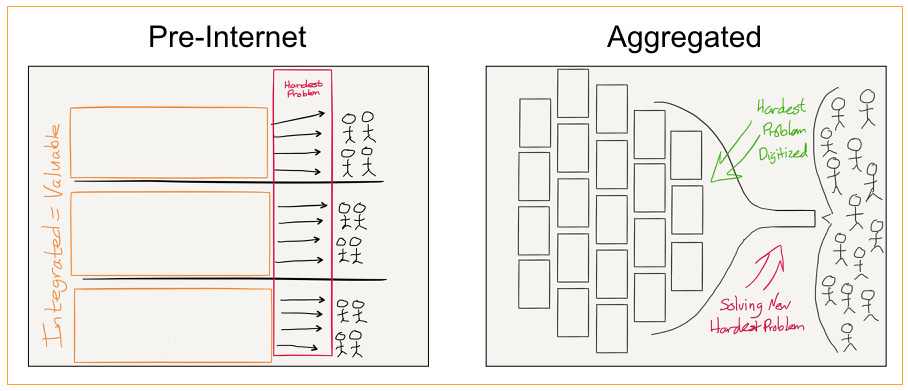Apple Wins
Apple Intelligence and aggregation puts Apple in a dominant AI position
When I watched WWDC 2024 last week, my initial reaction on the AI business landscape was: “I guess Apple wins.” I held off on immediately writing an article, just in case it was Apple’s reality distortion field.
Meanwhile, numerous takes on how unremarkable Apple’s WWDC was (if you were looking for iOS/Mac features, you mainly got the ability to move widgets around), or you got breathless Apple fan excitement that would probably be the same regardless of what they announced.
Relatively few outlets seem to realize how complete a coup this is on Apple’s side from a business perspective. It takes two to tango, and OpenAI basically pushed their chips all-in on Apple’s overall power being good for them vs. the other AI players (maybe literally, given how horrifyingly expensive this partnership probably is for them in AI inference costs).
Ben Thompson and Aggregation Theory
One of the first takes I went to read/listen to was Ben Thompson, who wrote “Apple Intelligence is Right on Time” (worth a read, this one is not paywalled). He famously talks about Aggregation Theory as applied to the internet, and predicted much of how the Google/Facebook age unfolded through that lens.
This lens isn’t new. Newspapers used to be aggregators, who were able to bottleneck access to consumers/customers and charge for it with low marginal costs for themselves. Ben Thompson’s take was that the Internet supercharged this, with marginal costs being truly near-zero—after all, even newspapers had to trade off space on the page, and technically printing and distribution (paperboy) costs.
I wanted to see if Ben Thompson would call Apple an Aggregator for AI. After all, that’s what my mind instantly jumped to, and replayed how Google, Facebook, and similar platforms sucked up the soul of the internet and never let it go.
I had to actually go listen to several of his other podcasts to find it—I think I ultimately heard him say it explicitly on Sharp Tech. Maybe he’s a little wary about it because some analogies don’t perfectly hold, but I’d say it does well enough.
Apple Intelligence in a Nutshell
Apple Intelligence, for those of you who didn’t follow as closely, is Apple’s “rebrand” of the scary AI to AI—Apple Intelligence. It largely runs on-device (which is why iPhone-wise, it only works on iPhone 15 Pros, the high-end of the latest devices and nothing else) to do simple things like summarize, run things for you, and basically be what Siri was supposed to be. You can do something like ask it to read a long health insurance policy document and tell you what the policy is on emergency room visits.
For things that are more extensive or difficult, possibly like the insurance policy document, it can also call on OpenAI’s ChatGPT to help answer. It will do so by explicitly asking, “Do you want to share this with ChatGPT?” literally every single time, but that helps clarify that Apple is largely handling most queries and makes the explicit to the user when their data may be shared. This data is supposedly not trained on by OpenAI, and also anonymized (but if you have an OpenAI subscription, you can access more context/more power as well, which I assume de-anonymizes you).
For the vast majority of users, this is a useful integration that may cause a thousand queries to bloom and get sent to OpenAI. Given how much their inference already costs and how much money they burn through from it, this is probably on the order of hundreds of millions of dollars of incremental cost per year… especially since Apple is not paying for ChatGPT.
Apple is the Aggregator
This use of ChatGPT within the Apple ecosystem is not exclusive, and there are rumors that Gemini and others will also be trying to figure out a way to integrate and strike a deal. In fact, in one of those numerous podcasts from Ben Thompson (which I currently can’t find), he speculates that Google probably couldn’t stomach not getting paid for Gemini so wasn’t the one to strike the deal.
Of course, this could have been different. No one could have jumped at it, which would have left Apple with just being another AI provider.
Instead, OpenAI jumped at the name recognition and distribution potential, and handed Apple the reins.
Every AI commentator has basically said, including OpenAI, that to be truly useful, an AI assistant needs to know a ridiculous amount of information about you. When do you normally do things? How do you normally prefer to respond to emails? What kind of things are important to flag to you?
All of this information happens to live on your smartphone.
Apple owns the OS for the smartphone and—vs. Microsoft’s Copilot-everywhere debacle where Windows Recall is now off by default (basically ruining Microsoft’s semi-equivalent launch)—Apple is trusted with the information. Apple knows everything if it chooses to use it, and it is leveraging that to gate-keep access to that valuable information to AI platforms who would like to access it to add more true value to consumers.
OpenAI took the deal with the devil first to get it, and ideally to get a first-mover and brand advantage, but because they did, everyone else also needs to jump on board to not lose relevance.
That puts all the power into Apple’s hands, just like with search. After all, remember that Google paid $20B in 2022 to Apple to stay the default search in iOS. That power is truly extreme, and it got consolidated back into Apple’s hands again.
This can still be screwed up
Google is the only real competition here because Google owns Android and has its own “I know everything about you” platform. They have a bit of a weaker hand because consumers don’t trust them with privacy as much, but AI’s benefits may ultimately outweigh the distrust—and what may matter is Google simply holds the actual data.
However, I’ve said for a while that Google should win the AI competition. They had a head start, they have massive compute infrastructure, and they have the differentiated, powerful resource of YouTube (which is walled off, officially, from other AI). Google, somehow, has continued to fumble the ball, and I’m not sure anymore if they will succeed. No matter how large your advantage is, if you screw up every time, you will still lose.
The same thing applies to Apple. Apple is in a pole position now. They hold a lot of the cards. A few things can still go wrong, though. The assumption is that Apple Intelligence (the part run by in-house models, and not through ChatGPT) is actually pretty good. If this is wrong and Apple needs to basically hand everything to ChatGPT to have an acceptable experience, the power dynamic shifts.
I’ve gotten some arguments from folks that Apple is the tech company that sucks at AI. I doubt that’s a safe assumption. Apple has not been acquiring AI startups like they’re going out of style for nothing.

However, if Apple Intelligence does suck or is extremely limited (i.e., Siri 2.0, and just as much of a disappointment as Siri 1.0), then this may not play out. Additionally, Apple Intelligence does rely on App Intents to integrate with third-party apps. I, personally, have Superhuman as my email client, Things as my to-do list, and Drafts as my quick note-taking app. Unless App Intents from the developer of these apps exposes this data to Apple Intelligence, it can’t do anything with it.
Maybe Apple Intelligence will be so shockingly useful that even I may switch away from all of these to Apple Mail, Reminders, and Notes (respectively). However, Apple does have a risk that third-party apps that run on its system don’t jump on board. This is a bit less of a threat vs. Apple Intelligence just sucking, though. Even if it goes slowly, Apple in-house apps becoming massively enhanced by AI will probably induce third-party apps to (potentially begrudgingly) start integrating it.
The new AI age’s dominant players… are likely the same players as before
I’ve had a bit of theme on this Substack that a lot of the AI gold rush is actually false. Many of the winners are not the new startups, but the old players. Structurally, the way AI compute works—specifically, the same way large-scale compute worked for Internet companies—means that the same players who figured out how to dominate the Internet age coincidentally have the same tools needed to dominate the AI age. This is yet another indicator towards that.
I do actually hope some power of the big companies will be broken—not just for my career as a VC who puts food on the table from startups, not big tech—but also to spur more innovation speed, competition, and benefits for society. Big companies inevitably move more slowly and behave more to protect their domains rather than shaking things up. Newcomers don’t have as much to lose, so are happy to “blow up the system” and totally change the business and tech landscape.
However, for now, the game is Apple’s to lose. We’ll see how they do.





A quick thought: Apple has been famous for its underlying hardware pivots (PowerPC -> Intel -> Apple Silicon). I would predict they are thinking and planning to remain competitive across a wide variety of AI algorithms, APIs, and hardware.
An interesting analysis that looks 'behind' the presentation on Apple Intelligence. In fact, despite the fact that the technological level according to many analysts is still not comparable to that of other competitors on the AI theme, Apple has always moved carefully in the acquisition of startups on the topic and in my opinion it will implement its strategy which has always been applied but slightly turn on AI: focus on the consumer. The issue of privacy and app integration is in fact a shift especially for the user, and could also be rewarded thanks to the strategic asset of its community that many other competitors lack. Thanks for the analysis.